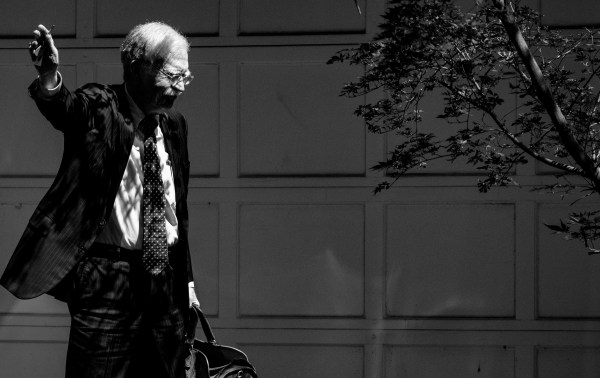We must confess that our adversaries have a marked advantage over us in the discussion. In very few words they can announce a half-truth; and, in order to demonstrate that it is incomplete, we are obliged to have recourse to long and dry dissertations.
Frédéric Bastiat, 1845
Mr. Goldberg, meet Mr. Brandolini.
Readers of these pages of course know Jonah Goldberg. Alberto Brandolini is an Italian computer programmer who gave us Brandolini’s Law, which holds: “The amount of energy needed to refute bullsh-t is an order of magnitude bigger than that needed to produce it.” According to lore, Brandolini was inspired to put this into succinct form by seeing a television interview with Silvio Berlusconi (in his day, the Luciano Pavarotti of bulls—t) right after reading Thinking, Fast and Slow. (I will here confess some envy at the fact that Brandolini’s Law has caught on, while Williamson’s Ratio—40.44:1, the average number of intelligent English words it takes to refute one word of dishonest and illiterate horsepucky—is gathering dust on a shelf at the Museum of Exanimate Rhetorical Devices.) The same idea has been expressed for centuries in various misattributed adages about fast-moving lies and slowpoke facts lacing up their boots. “Falsehood flies, and the Truth comes limping after it,” wrote Jonathan Swift, which seems to be the OG version of the proverb in its most familiar form.
Jonah has been getting poked by the pointy end of Brandolini’s Law for a little while now. Besides being a colleague and friend of Jonah’s, I am, and have long been, an admirer and enjoyer of his work, and I read him and listen to him pretty carefully. I won’t claim that I’ve been keeping a tally of how many times he has pronounced himself “exhausted” by the political conversation in the past couple of years, but it’s enough that if it were beers at a happy hour we wouldn’t let him drive. Jonah says he is finding it difficult to maintain his passion and his interest in daily politics, and, happily for the world of podcast listeners, at least some of his energy has been diverted into wide-ranging conversations about such far-from-the-headlines stories as the influential epigones of Leo Strauss and whether Alexander the Great could have successfully taken on the Romans if history and that nasty Babylonian fever had not deprived him of the opportunity. It’s excellent stuff, I’m enjoying it and, as far as I’m concerned, Jonah can write about whatever Jonah wants to write about. And while I am pretty sure that Jonah knows this, I don’t know that the wider reading public necessarily appreciates what’s going on here.
Ain’t nothing in this world happens by accident.
Whether you’re talking about the effects of Brandolini’s Law, the infamous “Gish Gallop,” the constantly programmatic lying of Tucker Carlson and J.D. Vance, Steve Bannon’s “flood the zone with [the approximate contents of Steve Bannon’s stately noggin]” strategy, Russian disinformation campaigns (to the extent that these are separate from the work of Bannon, Carlson, et al.), and what have you, the bottom line is the same: Exhaustion is a strategy.
I am not entirely sure what to do about it.
The digital archaeologists of the internet know that this stuff goes back into the pre-Netscape days of discussion boards and the other half-forgotten exotica of the digital world as it existed before the world learned to pronounce “.” as “dot.” But from the relatively modern point of view, exhaustion as a strategy seems to have gone mainstream during the episode about a decade ago known as Gamergate, which Wikipedia describes succinctly as “a loosely organized misogynistic online harassment campaign motivated by a right-wing backlash against feminism, diversity, and progressivism in video game culture.” I try not to be a snob and I dislike rioting in all its forms, but every time I read about people blowing a head-gasket because of some perceived cultural offense within the world of … video games! … it makes me think that those Parisians who supposedly rioted after the premier of Stravinsky’s Rite of Spring were paragons of civilization compared to whatever kind of barely improved monkey it is we currently are in the process of becoming.
The Gamergate harassment was intentional and sustained, and there was some coordination and resource sharing—contact lists, form letters, that kind of thing. And while it offered a glimpse at some things to come (such as the habit of insisting that pedophilia, of all things, is the ultimate esoteric cause of most political disagreements), what it mainly amounted to was repurposing “leaderless resistance” models from the world of terrorism and insurgency as practiced by groups as diverse as the PLO and the white-supremacist Bruder Schweigen (which had nothing at all in common other than their hatred of Jews, their anti-Americanism, 87 percent of their economic and political assumptions, a focus on acquiring sovereign territory, their penchant for conspiracy theory, their engaging in money-oriented organized crime, their bedside books, and their fashion sense).
Old-school terrorism and online harassment/disinformation campaigns are very different things, of course, but they are similar in that their efforts are mainly meant to operate as psychological instruments. Terrorism is a weapon of the weak—resorting to it is a tacit admission that one could not prevail on an honorable battlefield, and nobody really thought that, say, the al-Quds Brigades were going to defeat the Israel Defense Forces. Harassment/disinformation campaigns work the same way: The point is not to defeat the other guy in positive terms but to cause him to simply give up. From a purely game-theoretical point of view, one can see how that kind of strategy makes a lot of sense: It costs relatively more to acquire the resources to defeat the other party on the battlefield; it costs relatively less to simply hurt the other party enough that he decides further fighting isn’t worth it.
(And while I do not want to go down that particular rabbit hole right here: Yes, it surely is the case that the strategy of making it hurt too much to keep fighting is very much a part of conventional military operations, too, and not at all restricted to terrorist cells. The line between terrorism and conventional warfare is not a straight, bright one.)
There isn’t much need for me to spell out in any detail how exhaustion as strategy works in the context of modern political discourse, because most of you (when you foolishly stray beyond the pages of The Dispatch!) experience it every day: the obvious lies and distortions, the imputations of bad faith (or pedophilia or whatever) based on nothing, the random meaningless zig-zags to avoid real argument, motte-and-bailey stuff, the personal stuff, all the greatest hits of the dishonest, the addled, and the imbecilic.
You know how it goes: “Big Tech conspired to give the election to Biden in 2020.” “No, they didn’t.” “They censored the New York Post!” “Yes, some platforms wrongly tried to suppress the Post’s story on the Hunter Biden laptop. That was stupid for at least 11 reasons and wrong on the merits, but it hardly means that Silicon Valley threw the election—they didn’t even succeed in quashing the story, which everybody knew about.” “Groomer!”
Etc.
I get why Jonah is exhausted. It is exhausting.
And that is how the f—ing idiots win.
And maybe they will—who knows? I’ve got a shoebox containing a bundle of Swiss francs and a .45, and the lid of the box has “Plan B” written on it in black Sharpie. Some Americans talk idly about moving to a foreign country, but my wife had the good sense and foresight to have been born in one, and I am sure opportunity must abound up there in Canada, what with all the gigantic piles of money they’re extracting from the United States with their cleverly Machiavellian and thoroughly Canuckish schemes regarding … timber stumpage fees. I’ll be fine, if it comes to the worst. I hear Saint-Louis-du-Ha! Ha! is lovely this time of year. If not that, then on to Punkeydoodles Corners. Canada: There’s a lot of it!
(America: I still love you, but I think we should start seeing other people.)
Still, it would gall me to let the f—ing idiots win, just on general principle.
Happily, we do not have to do that. And there is a cure for exhaustion as a strategy—the very sensible countermeasure of contempt as a defense.
Truth be told, it matters hardly at all what Tucker Carlson thinks or says anymore. Some of us get a little mixed up about that, in part because we have personal relationships with some of these people (I see a lot of familiar bylines in Epoch Times these days) and in part because we live in this weird little world of political media. It is a little harder for people such as Jonah and me, because we grew up in a time when this kind of work was a lot more influential and important than it is now—and, at the risk of looking like I’m kissing the boss’s ass, it’s got to be even a little bit harder for Jonah, because he’s one of the people who helped make that first generation of online political media influential and important. It doesn’t really even matter all that much what is on Fox News, where the most popular show has a typical audience that is about one-eighth the size of that of an average regular-season NFL game and where many shows that people in my world feel the need to talk about routinely get outperformed by decade-old reruns of Law & Order and The Big Bang Theory.
(I can hear what the idiots are thinking: “If it doesn’t matter what Tucker says or thinks, it sure as hell doesn’t matter what you write, Williamson.” And that is—true! I write for a relatively small audience, and I’m satisfied with that. I have never sought to have political influence the way some columnists do. Some writers are McDonald’s, and some are Le Bernardin. I’m in it for the words, not because I am the kind of dork who gets excited when he gets a text from a politician.)
We should have contempt for Tucker and Fox News and X et al., and we should liberate ourselves from the delusional burden of caring about them and that world. We—especially here at The Dispatch—also have the ability to do something that old-style columnists back in the days when print was the big thing and syndicates were money-machines couldn’t do: We can speak over the heads of the people we don’t want to talk to, directly to the people we do want to talk to. The old-school columnists were always on the Sunday shows for a reason, and it wasn’t because Jack Germond (who called his very entertaining memoir Fat Man in a Middle Seat) looked great on television: Germond wrote for the Baltimore Sun back in the days when it was really hard to read the Baltimore Sun if you didn’t live in Baltimore. He also had a syndicated column that ran in a lot of newspapers, but if you wanted to reach a national audience, you really needed to be on television. You needed to be in that scrum. You couldn’t get the Washington Post or the New York Times in Lubbock or Bakersfield or Durant. Blessedly, the same technological and economic factors that have made a mess of the rage-monkey school of digital discourse (it costs almost nothing to produce and distribute bullsh-t) also apply to the better sort of work: It is just as easy for a guy with an intelligent Substack to reach readers all over the world as it is for the Wall Street Journal.
There are smart and well-intentioned people of good faith (on both sides of the aisle) out there, and it is possible to write for them without deep-dipping yourself in the cesspool of populist-popular political discourse. And, as it turns out, the rage monkeys do not pay for subscriptions and nobody other than a couple of lame retailers of erectile-dysfunction nostrums wants to advertise to them, so tussling with the monkeys is not how we get paid.
Yes, exhaustion is a strategy for the monkeys. But exhaustion is a choice, too, both for readers and for writers and other commentators. It doesn’t matter how many pearls you throw at the swine—pearls stay pearls.
And swine stay swine.
Words About Words
Nope nope nope: “Roger Federer’s Commencement Speech Wasn’t Just Viral. It Was Masterful,” writes the New York Times. But masterful doesn’t mean masterly—it means domineering. Which the gentlemanly Mr. Federer is not.
In Other Wordiness
A reader of my Father’s Day piece, in which I praise France’s great port city as “the Houston of Europe,” comments that he agrees with me about everything “except Marseille. I’ve been there a lot. But for its Mediterranean coast, it would be inferior to Houston.”
The spirit of Marcus Aurelius is still with us!
The reader was, I suspect, very discreetly correcting me: I had misspelled Marseille in my essay, and he introduced the correct spelling. That is the gentlemanly and discreet way to correct somebody when they make a mistake, mispronounce something, etc. In “Words About Words,” I generally focus on the errors or eccentricities of professional writers (and try to do so with some charity and humility!) but, in private life, one does well to follow our reader’s example and the advice in the Roman emperor-philosopher’s Meditations:
From Alexander the Grammarian, I learned to refrain from fault-finding, and to refrain from reproaching those who uttered some barbarous or ungrammatical or strange-sounding expression; but instead dexterously to introduce the very expression which ought to have been used, and in the way of answer or giving confirmation, or joining in an inquiry about the thing itself, not about the word, or by some other fit suggestion.
Excellent advice.
Elsewhere
You can buy my most recent book, Big White Ghetto, here.
You can buy my other books here.
You can check out “How the World Works,” a series of interviews on work I’m doing for the Competitive Enterprise Institute, here.
In Closing
Alexander the Grammarian was Alexander of Cotiaeum, an influential Greek intellectual and teacher who lived in Rome and was one of Marcus Aurelius’ teachers. Almost everything we know about him comes from a funeral encomium composed in his honor by Aelius Aristides, a celebrated orator. Sara Duncan, a high school English (and film) teacher of mine who recently passed away at the age of 84, deserves a better epitaph than I will be able to provide in this space. It isn’t saying enough, but it is something to say: She was without a doubt the finest teacher of any kind I have encountered in any capacity. Very few of us ever will be as good at the thing to which we dedicate our lives as she was at her chosen profession. She loved Moby-Dick, despised people who talked during movies, and did her students the honor of telling them the truth: I remember her remarking to a friend of mine who had given a presentation without very much preparation that her remarks had been “refreshingly content-free,” and she once described an inferior effort of mine as “the skeleton of what I am sure eventually will be a very good paper.” She gave the work back to me with no grade—it was not yet good enough for her even to bother grading. She was entirely kind and wonderfully encouraging, but she also had high standards upon which she insisted. She was my friend, and I dedicated the first book I ever wrote to her—and I wish that it had been a better book, though it wasn’t a bad one.
Next morning Stubb accosted Flask.
“Such a queer dream, King-Post, I never had. You know the old man’s ivory leg, well I dreamed he kicked me with it; and when I tried to kick back, upon my soul, my little man, I kicked my leg right off! And then, presto! Ahab seemed a pyramid, and I, like a blazing fool, kept kicking at it. But what was still more curious, Flask—you know how curious all dreams are—through all this rage that I was in, I somehow seemed to be thinking to myself, that after all, it was not much of an insult, that kick from Ahab. ‘Why,’ thinks I, ‘what’s the row? It’s not a real leg, only a false leg.’ And there’s a mighty difference between a living thump and a dead thump. That’s what makes a blow from the hand, Flask, fifty times more savage to bear than a blow from a cane. The living member—that makes the living insult, my little man. And thinks I to myself all the while, mind, while I was stubbing my silly toes against that cursed pyramid—so confoundedly contradictory was it all, all the while, I say, I was thinking to myself, ‘what’s his leg now, but a cane—a whalebone cane. Yes,’ thinks I, ‘it was only a playful cudgelling—in fact, only a whaleboning that he gave me—not a base kick. Besides,’ thinks I, ‘look at it once; why, the end of it—the foot part—what a small sort of end it is; whereas, if a broad footed farmer kicked me, there’s a devilish broad insult. But this insult is whittled down to a point only.’ But now comes the greatest joke of the dream, Flask. While I was battering away at the pyramid, a sort of badger-haired old merman, with a hump on his back, takes me by the shoulders, and slews me round. ‘What are you ’bout?’ says he. Slid! man, but I was frightened. Such a phiz! But, somehow, next moment I was over the fright. ‘What am I about?’ says I at last. ‘And what business is that of yours, I should like to know, Mr. Humpback? Do you want a kick?’ By the lord, Flask, I had no sooner said that, than he turned round his stern to me, bent over, and dragging up a lot of seaweed he had for a clout—what do you think, I saw?—why thunder alive, man, his stern was stuck full of marlinspikes, with the points out. Says I, on second thoughts, ‘I guess I won’t kick you, old fellow.’ ‘Wise Stubb,’ said he, ‘wise Stubb;’ and kept muttering it all the time, a sort of eating of his own gums like a chimney hag. Seeing he wasn’t going to stop saying over his ‘wise Stubb, wise Stubb,’ I thought I might as well fall to kicking the pyramid again. But I had only just lifted my foot for it, when he roared out, ‘Stop that kicking!’ ‘Halloa,’ says I, ‘what’s the matter now, old fellow?’ ‘Look ye here,’ says he; ‘let’s argue the insult. Captain Ahab kicked ye, didn’t he?’ ‘Yes, he did,’ says I—‘right here it was.’ ‘Very good,’ says he—‘he used his ivory leg, didn’t he?’ ‘Yes, he did,’ says I. ‘Well then,’ says he, ‘wise Stubb, what have you to complain of? Didn’t he kick with right good will? it wasn’t a common pitch pine leg he kicked with, was it? No, you were kicked by a great man, and with a beautiful ivory leg, Stubb. It’s an honor; I consider it an honor. Listen, wise Stubb. In old England the greatest lords think it great glory to be slapped by a queen, and made garter-knights of; but, be your boast, Stubb, that ye were kicked by old Ahab, and made a wise man of.”
If I am still waiting to be made a wise man of, I cannot blame my teachers. Sara Duncan, more than anyone else, taught me how to read and why to write. Her life had its share of hard turns, but she did right by her students and ennobled her profession. I hope that Herman Melville will have the good fortune of making her acquaintance on that celestial shore where, in touching the waters of infinite mercy, even old Ahab might once again be made whole.










Please note that we at The Dispatch hold ourselves, our work, and our commenters to a higher standard than other places on the internet. We welcome comments that foster genuine debate or discussion—including comments critical of us or our work—but responses that include ad hominem attacks on fellow Dispatch members or are intended to stoke fear and anger may be moderated.
With your membership, you only have the ability to comment on The Morning Dispatch articles. Consider upgrading to join the conversation everywhere.